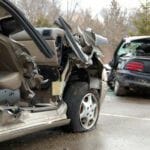Mandatory Logging Devices in Trucks are Here
March 1, 2018 / Truck Accidents
ELDs, or electronic logging devices, are now required equipment in interstate commercial trucks. The trucking industry has been at loggerheads about the use of ELDs ever since the Federal Motor Carrier Safety Administration (FMCSA) published a new rule mandating their installation in commercial trucks on December 16, 2015. The Supreme Court declined to hear a case that argued the devices were unconstitutional, so the ELD rule took effect on December 18, 2017. Because of the phase-in period, the rule will not be followed by enforcement officers until April 1, 2018. On and after that date, drivers and their trucks can be taken off the road if they don’t have an ELD—unless they have an AOBRD (automatic onboard recording device).
Not sure what we’re talking about? We’ll defuse the confusion for you.
ELDs and AOBRDs Explained
Simply put, ELDs replace the paper logs that drivers previously used to record their movements on the road, notably to record their hours of service (HOS). HOS regulations control the amount of time that interstate drivers can remain on the road. The regulations must be followed by interstate truck drivers whose tractor-trailer or truck weighs at least 10,001 pounds or carries hazardous materials requiring placards.
Falsification of hours of service under the old paper logs system was a problem. Because regulations require that truckers can drive only so many hours and must stop for specified breaks, taking advantage of the old system was tempting. Sometimes drivers were pressured by employers to lie on their logs and just keep going in order to make a deadline. Horrible accidents occasionally resulted from cheating the logs. But ELDs are supposed to make it impossible for drivers to falsify their records by automatically recording a truck’s hours of operation in real time.
AOBRDs are basically an earlier generation of electronic logging devices that some trucking companies had already installed ahead of the December 18, 2017 deadline. AOBRDs are grandfathered-in under the new rule; companies will have until December, 2019, to replace them with ELDs.
ELDs can reduce the time a driver spends on paperwork and can also keep dispatchers up to date, helping them plan truck loads in order to keep drivers in compliance with HOS regulations. It is believed that ELDs will address the issue of driver fatigue and the potential for deadly crashes. Driving a truck is one of the top ten deadliest jobs you can have, largely because of fatigue and inattentiveness problems.
With all these positives, why are some drivers and companies unhappy with the ELD mandate?
The Current Situation
One reason for the kickback on the part of trucking companies is cost. ELDs are not free. However, FMCSA does allow existing tablets, smartphones, and “rugged” handheld devices to be used in the place of ELDs as long as the entire system complies with all ELD requirements. One critical condition that must be met is the hardwiring of the system to the truck’s engine.
Sometimes ELDs and related confusion over regulations can create delays. The trucking industry these days includes many different parties, from drivers to truck companies to loaders to shippers. Some in the industry have reported that shippers in particular have not made their operations driver-friendly enough. DAT analyst Mark Montague noted, “I’ve been in drop lots where a driver has to spend a half hour hunting down his trailer. So there are a number of things shippers can do to make it friendlier for truck drivers and minimize their time spent at the facilities.”
Enforcement officers can also hinder progress. A vice president of compliance for Zonar Systems, Fred Fakkema, stated that officers who haven’t been told that AOBRDs are currently legal can create problems for everyone: “The issue today is when one of our legacy customers that are running AOBRDs, which are grandfathered in until 2019, are being questioned as to why they don’t have an ELD and then written up on the inspection report.”
ELD compliance, as of mid-January, 2018, was roughly 80 percent. However, smaller regional companies are running about 20 percent behind the larger, long-haul outfits. Compliance is expected to rise as the April 1 deadline approaches, because non-compliance will be costly. According to Mark Montague, “If you find out your load was delayed because the driver didn’t have an ELD and was stopped, that’s definitely going to be a huge negative.”
When others breach their duty, we keep ours.
Indiana truck accident cases can be complex legal claims that require thorough investigation and demand aggressive litigation to secure the best possible outcome for the plaintiff. While monetary compensation can never undo the damage done as the result of a truck accident, a financial recovery can ease the burdens of overwhelming medical bills, loss of income, and disability.
If you or a loved one has been involved in an accident with a tractor-trailer, we suggest you talk with the Indianapolis truck accident lawyers at Stephenson Rife. Both Mike Stephenson, with his more than three decades of experience, and Brady Rife, with his diverse experience in personal injury litigation, will commit the highest standards of client care to your case. Contact Mike or Brady today by calling 1-317-825-5200 for a free consultation, or use our online contact form.

 Mike Stephenson has 40 years of experience and is a trusted advisor to many individuals and companies. His current practice is dominated by civil litigation in state and federal courts. He focuses much of his time on handling catastrophic injuries caused by all types of accidents, including motor vehicle, trucking, workplace injuries, product liability, and fire, just to name a few. He also works extensively in construction accidents. [
Mike Stephenson has 40 years of experience and is a trusted advisor to many individuals and companies. His current practice is dominated by civil litigation in state and federal courts. He focuses much of his time on handling catastrophic injuries caused by all types of accidents, including motor vehicle, trucking, workplace injuries, product liability, and fire, just to name a few. He also works extensively in construction accidents. [ 